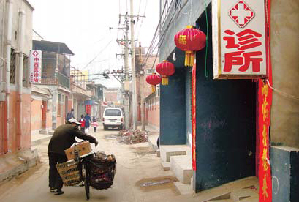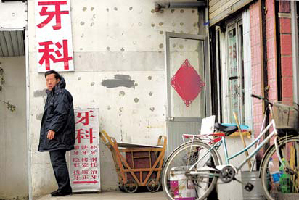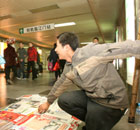Society
Poor patients gambling with their lives
By He Na (China Daily)
Updated: 2010-03-16 06:56
 |
Large Medium Small |
|
||||
Jiang's center, which opens from 8 am until 10 pm, is just 500 meters away from several bustling construction sites.
"We get about 20 customers per day but migrant workers account for a very small proportion," said Jiang. "I know a man who owns an illegal clinic and also sells vegetables. I've seen him holding a cabbage in one hand and pouring pills into a bag with the other. All 12 members of our staff are qualified to practice medicine but many patients still would rather take a risk on those quacks."
Su Jianxing, a doctor at the center, said even though they have reduced prices as low as possible, far below those of big hospitals, they will never be able to match the cost of the illegal clinics.
"The Health Supervision Office clearly states that unsealed medicines or individual pills must not be sold, but doctors at unlicensed clinics don't care," he said. "You want a bottle, they sell you a bottle; you want a pill, they sell you a pill. They even allow you to take medicine first and pay later. The funny thing is if you don't have money in your pocket, they even accept payment in other things, like cabbages and carrots. That's impossible for us."
When it comes to medicine, however, going cheap can be a costly risk, Su warned. "It is hard to guarantee the quality of medical supplies in the illegal clinics," he said. "They often provide inferior, expired and even fake drugs. The cost of this medicine is very low, so they can sell at much lower prices and still reap large profits."
However, the hardest part could be convincing migrant workers of the dangers of using unregistered doctors. In a recent survey of 100 migrant laborers by Beijing News, 85 percent said they preferred to visit small, cheap clinics when they suffer minor health problems.
Wang Youliang and Liu Yuchun, both in their 50s from Shangqiu, a city in Henan province, earn about 1,100 yuan ($160) a month working on a construction site in the southern suburbs of Beijing.
"I was suffering from a cold yesterday but I feel much better after having an injection at a clinic," said Liu Yuchun as he pointed in the direction of a line of bungalows. The shot and some tablets cost him just 20 yuan. "How much do you think we have to pay if we go to a big hospital?" he said. "We cannot fuss over things like colds, fevers, diarrhea and headaches. We don't go to public service center or even hospitals. A small clinic nearby can solve the problem easily. If I had not heard about H1N1 flu, 3 or 5 yuan would be the most I would spend on a cold cure."
Research by Capital Medicine Magazine found the average cost of getting treatment for a cold at 48 hospitals in Beijing is more than 110 yuan.
The owners of the clinic Liu Yuchun used are also migrant workers, said Wang Youliang, who added: "They are kind to us. We don't have the feeling of being looked down on like when we visit big hospitals."
Even among those migrant workers who are aware of the potentially fatal risks of using illegal clinics, few care, say analysts. "I've seen reports in newspapers about people dying after visiting illegal clinics but I don't think it's a problem. It's just bad luck," said a 28-year-old laborer surnamed Zhang from Shandong province as he washed his hair in cold water at a Beijing roadside. "I heard several days ago how a man visited a big hospital and doctors did surgery on the wrong leg. Even big hospitals have accidents."
For health supervision bureaus, back-street health clinics are a malignant tumor that is becoming increasingly difficult to treat. In Beijing, authorities have launched a series of campaigns to wipe them out but they remain rampant.
As well as the low costs and flexible hours, unlicensed medical centers also get around the law by meeting patients in one place and then treating them in another location, said Ma Yanming, a publicity official with the Beijing health bureau.
"If they don't have any signage that suggests they are a health clinic, it is difficult for police to punish them," he said. "And the most the authorities can do if they catch them is confiscate their equipment and medicine, and fine them. We need people to report illegal clinics to help us strengthen supervision."
However, the Beijing department is yet to set up a contact hotline for citizens.
Shi Haiying, a lawyer with the Beijing Guanteng firm who has handled several cases involving deaths at illegal clinics, said the punishment for doctors and owners is too soft.
"Compensation is too difficult to enforce," he said. "Illegal clinics are not registered with the local business administration, so once a tragedy happens it is hard to trace the suspects. Also, most clinic owners or 'doctors' are themselves migrant workers. They don't have any money for compensation."
When questioned why they open illegal clinics without the correct medical and legal certificates, some owners say because there is no punishment other than a fine of 50 or 100 yuan, said Shi. "Strengthening the crackdown of illegal clinics should not only be in words but also action."
 |
 |
|
A trader wheels his bike along a quiet Beijing hutong past an unlicensed clinic. PHOTO BY ZHANG WEI / CHINA DAILY |
a migrant worker stands outside a secluded medical center in the district. PHOTO BY ZHANG WEI / CHINA DAILY |







